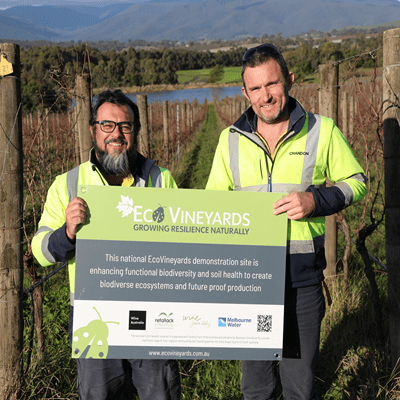Tell us in a few sentences about your experience as a viticulturist, how did you arrive here?
I’ve been working in vineyards across NSW, Tasmania and Victoria for the last 23 years., Domaine Chandon has been growing grapes and making wine in the Yarra Valley since 1987.
Why did you decide to apply to be an EcoGrower, was there something specific that influenced your decision and/or had you attended a previous EcoVineyards session?
We decided to apply to become an EcoGrower following the info session held in the Yarra Valley late last year. The program really struck me as a great way to do some meaningful trials on our vineyard and help to consolidate lots of ideas we have and practices we are already doing.
It will also be a great way to share the findings amongst our region, where much of the great work people have been doing is not currently shared or easy for others to adopt.
Can you provide a brief overview of your project ideas, and what you wish to achieve over the 3 years and why is this important to you?
We are hoping to focus on the establishment of perennial species in the undervine area that are:
- Ideally suited to our region, soil types and rainfall
- Require minimal management (low growing, self-seeding etc.)
- Will not greatly compete with vines for nutrients and water
- Enhance soil health and biodiversity within the vineyard
We are under increasing pressure to both limit the application of herbicides and reduce diesel use. The traditional methods of cultivating the undervine area and/or undervine mowing will not be a sustainable replacement for herbicides with the current plant species we have growing.
In short, we are looking for the ideal combination of species to establish undervine, and how to do this on a large scale.
Are you just starting to learn, or have you been enhancing biodiversity on your property and is this an extension of what you are currently doing?
We have been involved in revegetation and streamfront management projects with Melbourne Water on the property since 2006.
Our properties have large areas that are unsuitable for vineyards and have a unique opportunity to return these areas to native vegetation.
Currently we are undertaking biodiversity assessments of our properties to establish a ‘baseline’, allowing us to track the improvements or impact caused by our management of the land.
Tell us about your hidden superpowers, something that others don’t know about you or a practice you would like to champion?
I certainly don’t have any superpowers! Although one practice I would really like to see more of is recovery or recycle vine spraying.
My experience over the last 10 years using these machines indicates a considerable reduction in the amount of pesticide being used on the vineyard. Huge volumes of pesticide are wasted through conventional sprayers – these chemicals are then absorbed by the environment within the vineyard, placing many non-target species under stress and increasing levels of contamination within the soil (e.g., copper). Recovery spraying also reduces diesel use, storage levels of chemicals and operator exposure due to less tank fills and contamination of machinery.
Where do you see grape growing in the future, do you feel there is an urgency to change current practices? If so, why?
Winemaking has always been closely linked to the land the grapes are grown on. Planting grapevines requires a long-term vision. Any impact we make on the land (negative or positive) will influence the sustainability of producing high quality grapes, and therefore wine, from that land.
Agriculture in general has a unique opportunity, given the amount of land, plants and animals under our control, to make a real difference to biodiversity and carbon sequestration. We need to take a broader view of the land we manage and not just focus on the rows of grapevines.
We are being increasingly pressured by the market for our wines to show our ‘eco/enviro’ credentials. We grow a luxury product and consumers want to be confident that the wines they are buying are making a positive environmental and social impact.
What else would you like to share with the broader EcoVineyards community, what gets you excited about the future?
We are facing many challenges to the way we are growing grapes and making wine, and these are forcing us to look outside our comfort zone and beyond many of our established practices.
I think there will be a broader recognition of the way many growers are operating with regards to improving their sustainability and biodiversity, allowing them to account for an economic as well as environmental benefit.

